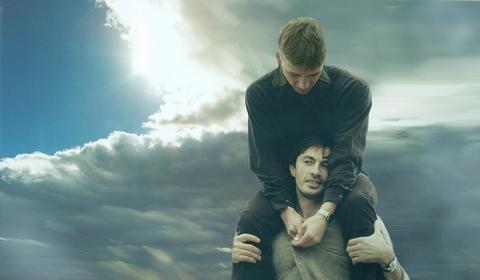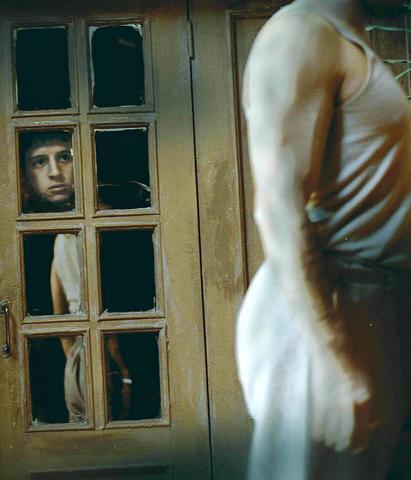Aleksandr Sokurov is indeed a rare-find in the world of filmmaking. Seen as Russia's most important contemporary filmmaker after Andrei Tarkovsky, he is a frequent visitor to Cannes despite having his films banned from the former Soviet Union for nearly 10 years before 1986.
Two years ago he finished a historic drama Taurus, a biography of Vladimir Lenin. A year later he presented to the world his technically revolutionary digital movie, The Russian Ark, taking one continuous shot from the beginning to the end. This year the prolific filmmaker has made something totally different -- a family story.
The family drama takes place in a beautiful dreamland and centers on a love between a father and his son that is like a fairy-tale. Father and son live together in a rooftop apartment. They have lived alone for years in their own private world, full of memories and daily rituals. Sometimes they seem like brothers. Sometimes even like lovers.

PHOTOS COURTESY OF HAI PON FILMS
Following in his father's footsteps, Alexei attends military school. He likes sports, tends to be irresponsible and has problems with his girlfriend. She is jealous of Alexei's close relationship with his father. Despite knowing that all sons must one day live their own lives, Alexei is conflicted.
Alexei's father knows he should maybe accept a better job in another city, maybe search for a new wife. But who will ease the pain of Alexei's nightmares?
The film can only be described as stunning to look at, especially the sky, scenes from the rooftop house, the narrow streets and Alexei's constant nightmares. The shadows and colors look like oil paintings and every frame seems misted, making the film even more dreamlike.

PHOTO COURTESY OF HAI PON FILMS
The rooftop is the playground and an isolated world for the father and son and sometimes neighbors. They use a wooden board as a temporary bridge to connect the house and the roof. The men practice stunts on the board and weight lift or play soccer on the roof. This is also the place where Alexei says he wants to know about his mother's past and her death.
It is not only the cinematography that looks like a dream. Sokurov's play with time and spaces is also impressive. The soldiers uniforms look contemporary, but the dresses and hair styles of the women look 1950s. The streets look like a northern town but the bright dazzling sun looks very southern.
The actors' handsomeness also enhance the dream-like aspect of the story. Both actors Andrej Shetinin (the father) and Alexei Nejmyshev have well-built bodies. The former has a moody face besides his good looks, while Nejmyshev delivers angel-like expressions.
To some, such a peculiar intimacy between a father and a son may seem strange or close to incest. But the genuine feelings between the actors and Sokurov's poetic narrative makes everything look natural. Using his own words, this love is almost of mythological virtue and scale. It cannot happen in real life. It is the incarnation of a fairy-tale.
Father and Son is the second film of Sokurov's planned trilogy dedicated to the drama of human relations. The first film of the trilogy is Mother and Son (1996).
It will be interesting to see Sokurov's third film in the trilogy, which is a story about two brothers and a sister.

May 11 to May 18 The original Taichung Railway Station was long thought to have been completely razed. Opening on May 15, 1905, the one-story wooden structure soon outgrew its purpose and was replaced in 1917 by a grandiose, Western-style station. During construction on the third-generation station in 2017, workers discovered the service pit for the original station’s locomotive depot. A year later, a small wooden building on site was determined by historians to be the first stationmaster’s office, built around 1908. With these findings, the Taichung Railway Station Cultural Park now boasts that it has

Wooden houses wedged between concrete, crumbling brick facades with roofs gaping to the sky, and tiled art deco buildings down narrow alleyways: Taichung Central District’s (中區) aging architecture reveals both the allure and reality of the old downtown. From Indigenous settlement to capital under Qing Dynasty rule through to Japanese colonization, Taichung’s Central District holds a long and layered history. The bygone beauty of its streets once earned it the nickname “Little Kyoto.” Since the late eighties, however, the shifting of economic and government centers westward signaled a gradual decline in the area’s evolving fortunes. With the regeneration of the once

In February of this year the Taipei Times reported on the visit of Lienchiang County Commissioner Wang Chung-ming (王忠銘) of the Chinese Nationalist Party (KMT) and a delegation to a lantern festival in Fuzhou’s Mawei District in Fujian Province. “Today, Mawei and Matsu jointly marked the lantern festival,” Wang was quoted as saying, adding that both sides “being of one people,” is a cause for joy. Wang was passing around a common claim of officials of the People’s Republic of China (PRC) and the PRC’s allies and supporters in Taiwan — KMT and the Taiwan People’s Party — and elsewhere: Taiwan and

Even by the standards of Ukraine’s International Legion, which comprises volunteers from over 55 countries, Han has an unusual backstory. Born in Taichung, he grew up in Costa Rica — then one of Taiwan’s diplomatic allies — where a relative worked for the embassy. After attending an American international high school in San Jose, Costa Rica’s capital, Han — who prefers to use only his given name for OPSEC (operations security) reasons — moved to the US in his teens. He attended Penn State University before returning to Taiwan to work in the semiconductor industry in Kaohsiung, where he